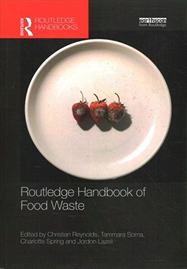Routledge Handbook of Food Waste
Material type: TextLanguage: English Publication details: London : Routledge, 2021Description: xxxi, 523 p. : illISBN:
TextLanguage: English Publication details: London : Routledge, 2021Description: xxxi, 523 p. : illISBN: - 9781032175737
- 363.728802 ROU
| Item type | Current library | Shelving location | Call number | Copy number | Status | Date due | Barcode |
|---|---|---|---|---|---|---|---|
 Reference Collection
Reference Collection
|
Seminar Library | Department of Food Engineering | 363.728802 ROU | 2022-23 | Available | 98223 |
Biography
Christian Reynolds is a Knowledge Exchange Research Fellow in the Department of Geography, University of Sheffield, a Technical Specialist in international food sustainability at WRAP, UK, and an adjunct Research Fellow at the Barbara Hardy Institute for Sustainable Environments and Technologies, University of South Australia. His research examines the economic and environmental impacts of food consumption; with focus upon food waste, and sustainable, healthy, and affordable diets.
Tammara Soma is an Assistant Professor in Planning at the School of Resource and Environmental Management at Simon Fraser University. She is the Research Director and also the Co-Founder of the Food Systems Lab, the first social innovation lab to address the issue of food waste and food insecurity in Canada.
Charlotte Spring is a postdoctoral researcher at the University of Calgary. Her PhD compared UK surplus food redistribution as charitable and activist practice. She has also undertaken considerable campaign work focusing critically on the relationships between food wastage and food insecurity.
Jordon Lazell is a Researcher at the Centre for Business in Society in the Faculty of Business and Law at Coventry University, UK. His research concerns sustainable consumption and production practices with a specific interest in food waste.
SUMMARY:
This comprehensive handbook represents a definitive state of the current art and science of food waste from multiple perspectives.
The issue of food waste has emerged in recent years as a major global problem. Recent research has enabled greater understanding and measurement of loss and waste throughout food supply chains, shedding light on contributing factors and practical solutions. This book includes perspectives and disciplines ranging from agriculture, food science, industrial ecology, history, economics, consumer behaviour, geography, theology, planning, sociology, and environmental policy among others. The Routledge Handbook of Food Waste addresses new and ongoing debates around systemic causes and solutions, including behaviour change, social innovation, new technologies, spirituality, redistribution, animal feed, and activism. The chapters describe and evaluate country case studies, waste management, treatment, prevention, and reduction approaches, and compares research methodologies for better understanding food wastage.
This book is essential reading for the growing number of food waste scholars, practitioners, and policy makers interested in researching, theorising, debating, and solving the multifaceted phenomenon of food waste.
